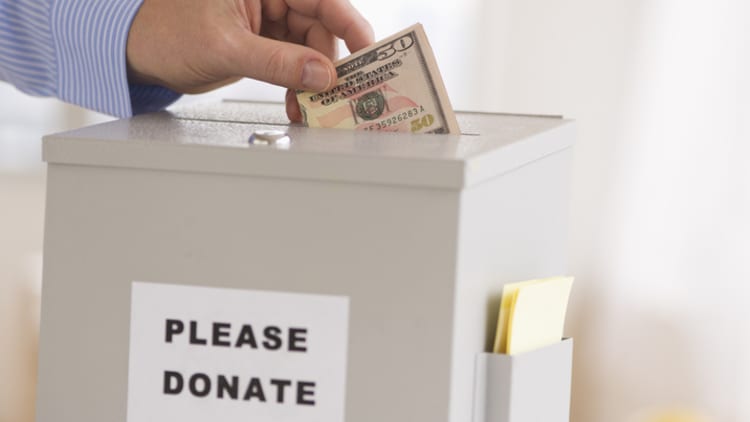As a generation, millennials have been hit hard financially by the coronavirus pandemic. But although some may have moved back in with their parents or say the pandemic has upended their financial security, they're also the generation that's giving back the most.
Nearly 3 out of 4 millennials (defined here as those ages 25 to 34) have sent some kind of financial aid to family or friends or donated to a nonprofit since the Covid-19 pandemic began, according to payment app Zelle's September Consumer Payment Behaviors report. The report is based on a survey of over 600 interviews a month of adults ages 18 to 72.
That's the highest rate among any of the generations polled. Gen Z (ages 18 to 24) had the second highest giving rate at 66%, followed by Gen X (ages 35 to 54) and baby boomers (ages 55 to 72).
Overall, 64% of Americans say they've sent sent financial aid at least once since the start of the pandemic, Zelle's report finds. In fact, there's been over $11.9 billion donated globally to Covid-19 related causes during the first half of 2020, according to an August report by Candid and the Center for Disaster Philanthropy, which tracks global philanthropic activity.
Finding the right place to give
If you have extra money in your budget and want to donate, whether it's to cause that's related to the pandemic or one that's focused on broader issues such as the environment or social justice, it's all about finding the right place. And that's different for everyone, says Eric Roberge, a certified financial planner and founder of Boston-based wealth management firm Beyond Your Hammock.
"Find that cause where you can make the most impact, whether that's giving some money directly to another individual or it's going through a nonprofit or it's donating to a business directly because you have some connection to them," Roberge says.
Finding a nonprofit that's making an impact for a cause you care about may require doing some research. Of the money raised globally for nonprofits related to health care and Covid-19, for example, only 5% of donations were designated for Black, Indigenous and people of color, according to Candid's report. That's despite these populations being disproportionately affected by the pandemic.
You can also maximize the impact of your dollars by focusing on organizations that keep administrative costs low. CharityWatch recommends finding nonprofits where 60% or more of every donation goes toward an organization's programs and services. You can use websites such as Charity Navigator, CharityWatch, BBB Wise Giving Alliance and Great Nonprofits to look up charities, their financial history and how donations are spent.
Additionally, look into any potential matching programs you may have access to. Many large employers offer to match employee donations to nonprofits, says Michael Hennessy, a CFP with Florida-based Harbor Crest Wealth Advisors. This is a quick way to multiply the impact of your donation. You can check your workplace intranet page or speak with HR to find out if your employer offers a program.
"The one additional step would have a huge impact on the causes you hold dear," Hennessy says.
Put your mask on first
But before you send money to family or friends in need or donate to a local nonprofit, you should first check in on your own financial health, Roberge says.
"It's just like when you're in a plane and they say, put your oxygen mask on first before helping someone else," Roberge says. "Not because you're selfish, because you need to be in good shape to be able to help somebody else. Don't sabotage your own well-being to help."
First, make sure that you're financially secure, Roberge says. "When I say financially secure, I'm talking about making sure that you have enough money in the bank to cover the 'what if' scenarios," he says. That means having three to six months of emergency savings set aside. If you have that secured, you're probably pretty stable for the short term.
Then look at your job and make sure you feel secure there too, Roberge says. If you don't, then it may be worth adding a bit more to your savings.
Once you have enough savings and your job feels secure, you can start to think beyond yourself. Say, I'm good, how about everybody else?
"Just make sure that you're taking care of yourself because they need you here and stable to make sure the entire economy stays that way," Roberge says.
Check out: We analyzed 111 rewards cards, and the best one could earn you $2,000 over 5 years
Don't miss: Americans are generous in their charitable giving during Covid-19, but how they donate changed



